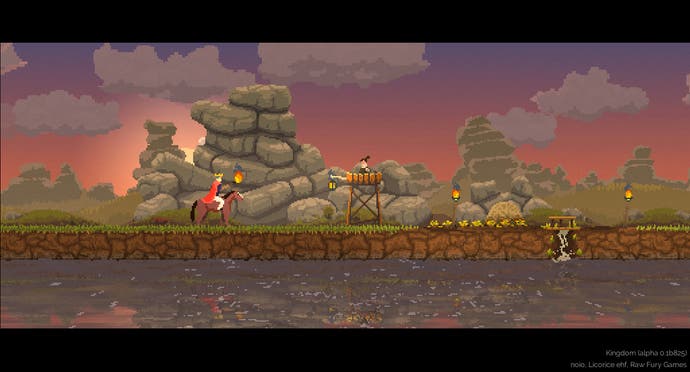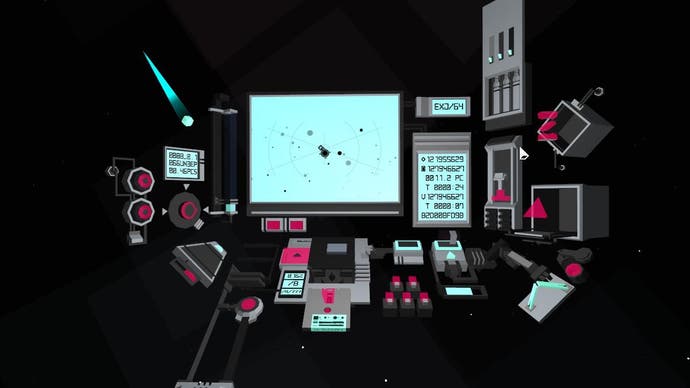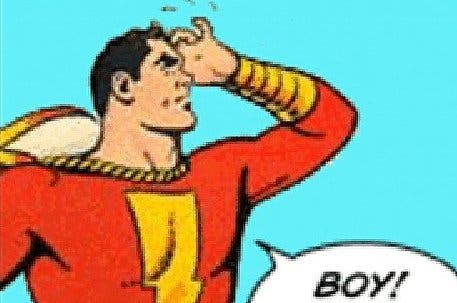Please games, let me be stumped
I'll pay more attention if you do.
I walked the EGX 2015 floor among a sea of games and one bobbled to the top. It wasn't shouting at me like a blockbuster but quietly resting, a king on a horse, like a scene from a pixelated fairytale. I watched someone sit down and play it, gallop left and right, screen following them through foresty scenes. But after an aimless while they gave up, no idea what to do. I left, they left, but the game didn't leave me, and so another day I returned, this time to play.
The game is Kingdom, a sequel of Flash game called Kingdom, I later find out, and it's coming out in a few weeks on PCs and mobiles. It's made by Thomas van den Berg, AKA noio, and Marco Bancale, AKA Licorice.
All I get when I sit down is a whimsical title and an introduction: I, as either King or Queen (I think it's random), need build a new kingdom. Then, off I go, and as I canter towards what will be the heart of the kingdom, I learn the absolute basics. I drop coins by people to have them follow me, and I use the same coins at points to build certain things. I have a small purse of coins. And I must survive the night. Then my hand is let go.
Right.
I buy a few people assuming I need them, buy some bows assuming I need them, buy some hammers assuming I need them, and then explore assuming that's how I find more money. Then I find the enemies, little scurrying things that chase me, so I run away, but then I turn back assuming there's a mechanic to allow me, the King for goodness sake, to be able to fight. I can't and I die - they knock my crown off and steal it. Game over, I must start again.
Right.
I stay closer to home now I'm appreciative of the threat, and find plots where I can put stakes in the ground to make a kind of wall. This time I protect the camp fire at the heart of my kingdom but, well, my enemies-by-night don't think much of my walls and break in and steal my things. Out of money, I reload and try again.
Right.
This time I realise I can upgrade my walls and I make sure I have more people with bows to defend them - people who also hunt wildlife and provide money. And I survive the night, and doing so rewards me with coins in the morning. I tidy a few things up, fortify here and there, and I end up surviving three further nights. I've been playing for around 45 minutes. Thing is, I don't know what to do now. It's like that moment in Minecraft when you build a shelter, make some food, and survive for a few nights. Now what?

I get up to leave and a man who's been watching me walks over. He's representing the game for the publisher Raw Fury. I say I could have used some help and he says he didn't give it on purpose, because working it out was/is the whole point. I think for a second, an odd feeling, and realise what he's getting at: those times I failed weren't mistakes to be erased, they were layers of experience. I wasn't losing, I was learning.
I walk away and talk about Kingdom all day, and I get to thinking: why don't bigger games do this? The magical effect of not knowing what to do means I pay more attention to my surroundings, to what's going on, because I'm searching for clues trying to figure it out. There are no checkpoints, there are no map-markers, there are no invisible hands yanking me through. I have to prize what I need from the game because I won't be handed it. I have to invest, and as the old adage goes, 'you get out what you put in'.
How many corridors have I run down in blockbuster games blinkered by a checkpoint's flashing goal? How many fantasy worlds have blurred into the background because I'm hurriedly finishing quests before bed? Let me go! Trust me. Don't a leave me breadcrumb trail, don't make me join map-marked dots: give me clues and make me think. Imagine if you had no journal in a role-playing game, and maps weren't marked with waypoints. You'd have to listen to directions and recollect quests, and in actively thinking about them establish a deeper mental imprint.
These convenience systems are symptoms of a market that's convinced bigger games are better, more impressive somehow, and that more hours means a deeper lasting impression. And when there are so many hours of content you can't be allowed to stall, because there's so much you need to see. But when you're being pulled through a story how much of it do you really see? Think about Dragon Age: Inquisition and The Witcher 3: how much of them do you remember? Did it ever feel like all you were really doing was turning the pages of an already-written book?

A short game called Her Story left a very deep impression on me earlier this year precisely because I had no idea - beyond it being about police interview tapes of a woman - what was going to happen. Nor did it tell me; I had to figure it out. I prodded, I probed, I made pages of notes in a separate document; I had to find its story and knew it more intimately as a result.
Christian Donlan tells me about a small game called MirrorMoon EP, which dumps you into spaceship cockpit, all levers and knobs, with no explanation of what they do - no tutorial, no tooltips. He had to prod and probe, and map, on a piece of paper, what each instrument did. It's both teaching him the game and allowing him to take a step further into it, and the experience was richer for it.
Plenty of smaller games have similar ideas yet fewer big games do. The few notable exceptions (and of course I'll forget some) are the Souls series, which are designed upon the idea of trial and error, and, perhaps, Skyrim, which shoves you into an sandbox open-world without much to go by. I marvel at how Skyrim spread into the mainstream but perhaps I needn't. Perhaps it means we do like working things out for ourselves, in big games and small.
Heck, bigger games used to make us figure things out. Grim Fandango was the big game of 1998, and it was a fiend - I got stuck loads of times. But I persevered, because that's what we as an audience were expected to do. There's a great quote attributed to Tim Schafer a few years ago where he says being stuck was what people used to call gameplay. But for some reason that kind of thinking disappeared, which is odd, because, older and wiser, I'm now more ready to be stuck than ever.


